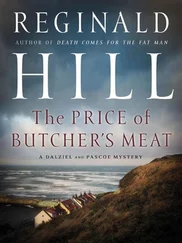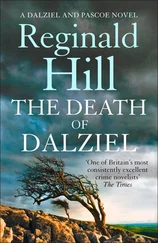Then a couple of years later on a visit to Seville’s magnificent Gothic cathedral, he had wandered away from his mother who was dealing with an emergency caused by little Cristóbal’s sudden discovery of the pleasures of projectile vomiting. Finding himself in a gloomy and deserted cloister, Mig had become aware of one of what he thought of as his friendly presences. He bent his mind to encouraging it to materialize, which it did, but this time terrifyingly in the form of a wild-eyed and disheveled old man who had come hobbling toward him with clawlike hands outstretched, an incoherent babble of Latin and Spanish and English spilling from his toothless and drooling mouth.
Mig had been so afraid he would probably have fled blindly and got himself utterly lost in the vastness of the old cathedral. But when he turned to run, he saw a young priest standing a few yards away. The man had smiled and beckoned. He had followed, trotting fast in an effort to come up close behind his guide but somehow never getting any nearer. Then they had turned a corner and there were his mother and brother who hadn’t even noticed his absence.
When he looked to thank the priest, he had disappeared. But he’d never forgotten that young face with its sweet smile.
And now he had seen it again.
Musing on what this could mean, he returned to his room, where he stripped the stained sheet from the bed, checking that nothing had penetrated to the mattress, then thrust it into the linen basket that stood in the corner. His mother, being English, had been very insistent that her sons were not going to grow up with any hidalgo expectation that the world owed them a living. “Noblesse oblige,” she said. “Which means you don’t expect other people to pick up your dirty washing.”
Cristina (née Christine) Madero’s elder son now sat on the edge of his bed and contemplated his future. For years the only ambition he’d nursed which ran counter to his preordained lot of running the family business had been to sign on as a striker with, first of all, Sevilla FC and ultimately Man United. At first these strange physical symptoms had only concerned him as possible obstacles to his athletic ambitions. But there seemed to be no long-term effect, and what made him abandon his hoped-for sporting career was the gradual realization that, though he was good, he would never be Best. Anything less had no appeal, and he set aside his football boots with no regrets.
Now it seemed to him that perhaps he had been denied that ultimate sporting edge because another purpose was written for him. To have interpreted this intermittent irritation in his hands and feet as a form of stigmata would have been blasphemously arrogant. But the blood today had changed all that. The blood and the second manifestation of the young priest. The first time the vision had invited him to follow. Now, ten years later, it had offered him a gift. The symbolism of the eggs was not hard to read. In form perfection; in content life. Was not that the essence of a priest’s existence, to strive to be perfect and so reveal life’s true meaning?
The more he thought about it, the more it seemed to him clear that this was the message he had been receiving for all his short years.
Yet he was in many ways what is called an old-fashioned child, and he knew that getting other important people to accept his sense of vocation was not going to be easy.
Problem one was his own family.
The Maderos were in the eyes of their bishop the very model of a good devout Catholic family – generous in charity, regular attenders at Mass, both their sons serving as altar boys – but never in the five hundred years since they started to make their name in the wine business had a single man of the family offered himself for the priesthood.
Problem two was their family priest.
Father Adolfo was a hardheaded Catalonian who regarded what he called hysterical religiosity with a cold and cynical eye. His reaction to any suggestion that Mig was specially chosen by God as evidenced by the stigmata was likely to be a cuff round the ear, followed by a recommendation to the family that they seek a good child psychiatrist to nip this childish delusion in the bud.
So when Mig sought an interview with him, he limited himself to the unadorned statement that he felt he might have a vocation. He was glad of his discretion when Father Adolfo’s reaction was to throw back his head and let out a long booming laugh.
When the echoes had faded, the priest said, “Have you talked to your father about this?”
“No, Father,” said Mig.
“Then let’s go and see him now. I’m not having a decent generous man like Miguel Madero saying I’ve been sneaking behind his back, subverting his son and heir.”
Miguel Madero’s reaction had been one of amazement, which he showed, and horror, which, out of deference to the priest, he tried to conceal. But the shock was too great and it was apparent both to Mig and the priest that Madero Senior could hardly have been more distressed if told his son had ambitions to be a fundamentalist suicide-bomber.
Father Adolfo, though having no desire to appear to encourage what he suspected was an adolescent fancy, was not about to let the dignity of his calling be traduced.
“To be called to the service of God is the greatest honor that can befall a true Catholic,” he said sternly.
“Yes, of course… I was selfishly thinking of the business…”
“The Church’s business comes first. You have another son to look after yours,” said the priest shortly. “You will want to speak further to Mig. So shall I. Let us both pray to discover the truth of God’s purpose.”
The next few months saw Mig’s infant sense of vocation tested to the full.
His father’s motives for opposition were practical and genealogical. Mig had shown a peculiar aptitude for all aspects of the family business, commercial and vinicultural. His flirtation with football apart, he had never seemed likely to divert from his preordained role as head of the firm, the sixteenth Miguel in an unbroken line since the fifteenth century. Sherry is a sensitive creature. It likes calm and continuity. Miguel Senior was so upset that he hardly dared go into the bodega during this period.
His mother’s objections were English and social. Behind every great man there is a great woman, telling him he’s driving too fast. This was Cristina Madero’s role in the family, and she found it hard to accept that her control of her husband did not extend to her son. She also felt things would have been managed better back home. The rich Catholic families of Hampshire provided the Church with money, congregation, and voluntary workers, but saw no reason to provide priests, not when the poor Catholic families of Ireland needed the work.
Only Mig’s young brother, Cristo, inspired by a vision of his future which did not involve being perpetually second-in-command, encouraged him.
Father Adolfo was the one who most vigorously questioned his vocation. “It means a calling,” he mocked. “Are you sure it’s not just an echo of your own vanity?”
Often Mig was tempted to silence him with the revelation of his experience of the stigmata, but a natural reluctance to make such an enormous claim kept him quiet.
But one day when Father Adolfo sneered that he had so far seen precious little evidence of that special spirituality he looked for in a postulant, Mig could not resist the temptation to put him in his place by revealing his other special gift.
Far from being impressed, the priest reacted as if he’d confessed a mortal sin.
“You foolish child!” he cried. “Such trafficking with the alleged spirits of the departed is a common trick of the devil to seduce susceptible minds. Remember Faustus. The Helen he saw was no more than a succuba, a demon that comes in the guise of a naked woman and steals men’s seed. Be not deceived, my child. These fancies of yours are the first steps toward the mouth of hell which gapes wide to receive errant souls.”
Читать дальше
Конец ознакомительного отрывка
Купить книгу












